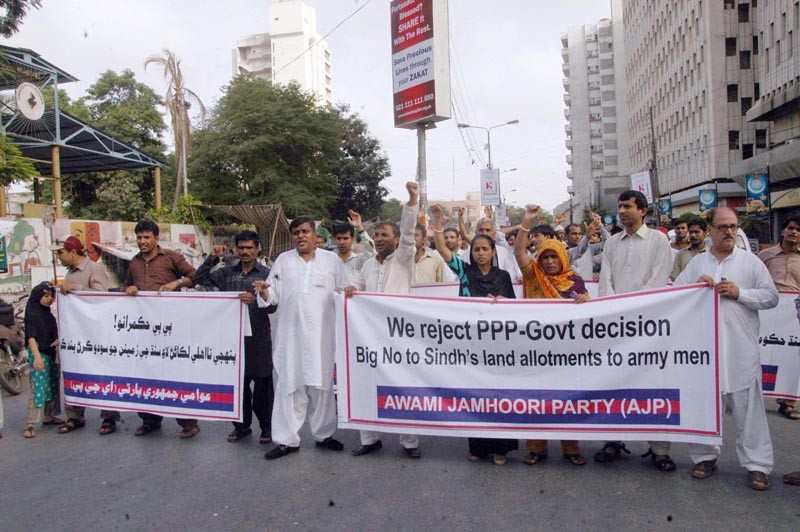
The allotment of 9000 acres of land in Sindh to Rangers has irked many Sindhi nationalists

Ethno-nationalist parties, left-leaning groups and civil society activists in Sindh are enraged at what they call the provincial government’s "eagerness" to give away 9000 acres of forestland to the Pakistan Army.
They allege it was an effort by the Pakistan People’s Party-led administration to appease the security establishment, after the party co-chairman Asif Ali Zardari’s tirade against the military leaders last month.
Although, the country’s mainstream media is hardly following the mass protests against the controversial allotment gaining momentum across rural Sindh, the regional Sindhi-language newspapers and TV channels are regularly covering the outcry.
The protesters claim that Sindhi farmers who are arguably the poorest in the country with 64 per cent being landless or owning less than five acres of land, are the most deserving candidates for the government land and not "some outsiders" -- and that the provincial government should immediately withdraw the proposition.
In 2001, the Pakistan Army had formally applied for 35,521 acres of forestland in Garhi Yasin of Shikarpur district for distribution among the heirs of martyred and wounded soldiers. The application stayed dormant all these years, including the Musharraf years.
Media reports suggest that since becoming the army chief, General Raheel Sharif personally pursued the application. Late last month, three days after former president Asif Ali Zardari lashed out at the army for overstepping its domain, the Sindh government announced its decision to have agreed ‘in principle’ to make an allotment for the available 9000 acres.
Sindhi intellectuals see the allotment in a more historic context, blaming the centre for treating Sindh’s land as something to be doled out on important national occasions. They are of the view that since British times, the land of Sindh has been the object of imperial largesse, which is being perpetuated by the present government.
When the Hurs were defeated by the British and when the Sukkur barrage was constructed in 1930s, massive swathes of land were given away to non-Sindhi soldiers and senior beaureucrats of imperial army as mere gifts, which, the people of Sindh, never got back, says journalist Mujahid Shah.
"Why does it have to be Sindh always?" asks Jami Chandio, an author and activist. "Land is not only an economic resource but a means that paves the way for migration and in the long run threatens the socio-cultural fabric of a community."
Chandio points out that Sindh lost 1.6 million acres of land to outsiders, especially the Punjabi elite, when the One Unit system was introduced in 1954.
Then with the completion of the Kotri barrage in 1957, thousands of acres of land was given away to Punjabi soldiers and bureaucrats, bringing in settlers from other province.
"And it does not end here. If a cricketer hits a sixer, he gets a sizable acreage in the province out of good will, as if the land of Sindh is only meant for such dole outs," he says.
Abdul Khaleq Junejo, the chairman of Jeay Sindh Mahaz (JSM), a nationalist party, says that the general sentiment about the allotment in the province is of utter outrage. "The PPP has shown total disregard for the public opinion in Sindh and is pursuing its own vested agenda at the cost of our land."
According to a statement issued by the provincial government, the forestland allotted to the army can only be utilised for agricultural purposes. However, environmentalists and local leaders argue that such clauses are mere eyewash since new settlements will be built and natural habitat of the area will be stripped bare.
However, observers who sympathise with the PPP say that the provincial government was under immense pressure from the military establishment to approve the allotment.
In fact, even the PPP leader Senator Farhatullah Babar in a speech in the Senate indicated that his party’s rejection of demand for lands had brought the provincial government on collision course with the Rangers.
The tussle between the security establishment and the elected provincial government in Sindh continues to be at the core of the political discourse in the province. When the paramilitary forces began raiding civic agencies in Sindh, especially Karachi, the Sindh chief minister Qaim Ali Shah publicly noted that the Rangers was overstepping its boundaries defined by 18th Amendment.
Moreover, the second largest party in the province Muttahida Qaumi Movement (MQM) kept insisting that the chief minister should not extend the Rangers’s stay in Sindh. The MQM has also advised that the Sindh government should conduct a referendum on the issue and even threatened to go on an indefinite sit-in outside the chief minister’s house. But it is interesting to note that while publicly expressing displeasure over its actions all along, the PPP-led provincial government has finally extended the paramilitary force’s stay in the province with special powers for another month as the orders expired on July 7, 2015.
This article was published in The News on Sunday on June 12, 2015 under the title Voices of people of the land.